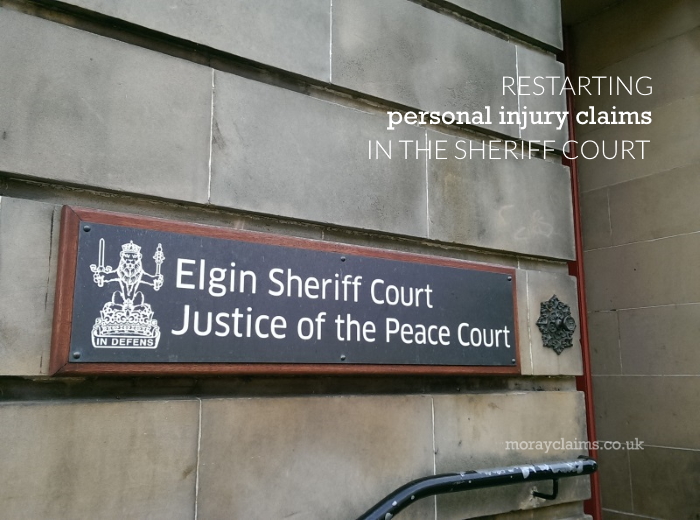
Personal injury claims in the Sheriff Court are more or less at a standstill.
Though the lockdown was quite sudden when it came, in some ways, it had been predicted.
Scottish Courts and Tribunal Service (SCTS) had been making positive noises about how it might be possible to keep the litigation process going by means of telephone conferencing or written submissions.
However, the guidance issued for Sheriff Courts on 25 March 2020 indicated that only essential court business would proceed. For most types of civil court business – including personal injury and family law cases – the litigation process was frozen.
Civil court hearings for personal injury actions scheduled for final hearings with witnesses between March and June 2020 were postponed.
This applies across all Sheriff Courts, including our own local Elgin Sheriff Court.
There has been criticism of the apparent slowness of the courts to adapt.
Here’s a report from the website of the Law Society of Scotland.
In personal injury matters, the claimant is usually represented by a solicitor and the opponent by insurers – who may themselves have appointed solicitors to represent them.
We know from our own experience that it has been possible to continue to operate effectively even though it is not possible to have face-to-face meetings.
In the time since lockdown started, we have had regular meetings with clients, advocates and expert witnesses using Zoom and WhatsApp.
While it has not been possible (or advisable) for all medical appointments to take place, some of our clients have had medico-legal appointments with orthopaedic and psychological experts by the same remote meeting methods.
Insurers and their solicitors have no doubt reacted to the changed social conditions in similar ways.
One of the concerns expressed by SCTS was that clerks would not be able to have access to case papers.
However, in cases which are in court, the solicitors on each side will almost invariably have complete copies of the court papers themselves. These could be made available to everyone for any hearings. If there is agreement between the parties that the present state of the case can be fairly portrayed to the court, there can surely be little objection to procedural hearings going ahead.
Over 95% of personal injury actions raised in court settle by agreement at some stage.
They do not require to go to a final hearing with witnesses.
It means there is an even stronger argument to try to keep the wheels of civil justice turning for personal injury cases.
It is the final hearings with witnesses which would be the most problematic to hold by remote means. But, in most cases, such hearings will not be required.
Scotland is not currently comparing well with other jurisdictions.
In a tweet, the Vice Dean of the Faculty of Advocates, Roddy Dunlop QC, drew attention to a report of an English case at the beginning of April 2020 which illustrated that the court system in England and Wales seems to be getting to grips with these new social conditions much better than their counterparts in Scotland.
This is the most palpable example of why the SCTS stance is harmful. Every other jurisdiction seems prepared to keep justice rolling. So why is scotland mothballing everything? The profession stands ready to do whatever is necessary to keep the wheels turning. https://t.co/viqs5f6YPJ
— Roddy Dunlop QC (@RoddyQC) April 8, 2020
Justice halted is justice denied.
We hope that progress can be made soon towards reopening of those civil court procedures which can be conducted efficiently and fairly while we all keep a safe distance from each other.
It is in everyone’s interests.